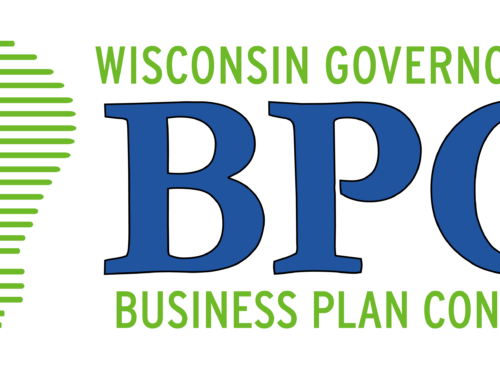
A panel at Small Business Academy included (from left) Elmer Moore of Milwaukee Denim Co., Robert Pyles of McDonald’s, David Maaske of SCORE and Kim Jankowski of U.S. Bank. At left is moderator Craig Shanks of U.S. Bank.
From the perspective of peace of mind as well as personal finances, “starting a business is not a good decision,” Milwaukee Denim Co. owner Elmer Moore told an audience of several dozen small business owners and aspiring entrepreneurs today at the Small Business Academy that was held as part of MARKETPLACE: the Governor’s Conference on Minority Business Development.
Moore clarified that while he is a business owner himself and supports others’ entrepreneurial dreams, business owners can invest large amounts of their own time and money before a new company becomes profitable. “There are so many other things you can do with your money that have a more certain positive return,” Moore said, and encouraged audience members to pursue their business plans only if they are truly passionate about making an impact and committed to seeing it through.
Moore was one of more than two dozen speakers at the Small Business Academy, which featured presentations by business owners and resource providers, as well as roundtable sessions where attendees could receive personalized advice in a conversational format.

Lt. Governor Rebecca Kleefisch spoke at the Small Business Academy and congratulated attendees on their decision to take the risk of starting a business.
Lt. Governor Rebecca Kleefisch, at whose suggestion the Small Business Academy was first organized as part of MARKETPLACE four years ago, congratulated attendees on their decision to take the risk of starting a business. “You are the entrepreneurs,” she said. “You’re the innovators. You’re the risk takers. I am so proud of your success, but I am also so proud of what I have no doubt you will achieve in the future. Your future is exceptionally bright.”
Throughout the morning, attendees heard from a variety of public- and private-sector resource providers about the tools and assistance available for business owners who are just starting out in Wisconsin.
One of those was the microlending organization Kiva, which has partnered with minority chambers of commerce in Wisconsin to help enhance access to capital for small business owners who are vetted by the chambers.
Small businesses have a long tradition of borrowing money from within their communities to get through the early years an achieve profitability, said Amy Narr, Kiva lead for Wisconsin. With these partnerships, she said, “Kiva becomes part of that community.” She noted that since in Wisconsin, Kiva is housed at the Wisconsin Women’s Business Initiative Corporation (WWBIC), loan recipients can benefit from the classes, coaching and other resources WWBIC provides.
Hermione Bell-Henderson, coordinator of business, technology and periodicals for the Milwaukee Public Library, discussed the resources the library system offers, including wifi; computers; meeting rooms; and special business book collections, databases and online courses that can be accessed by holders of the special library card category for business owners. “We consider ourselves the original coworking space,” she said.
Along with Moore of Milwaukee Denim Co., Robert Pyles, who owns local McDonald’s restaurants, also represented the perspective of a seasoned business owner. Pyles’s advice: “Don’t trust yourself, because you’re passionate. You’re probably the worst person to listen to.” Instead, he recommended seeking advice from parties who are less emotionally attached to your business.
Kim Jankowski, vice president and branch manager for U.S. Bank, offered a road map for young businesses to establish solid financial practices that will position them well if they need to seek a bank loan in the future. Her recommendations included handling all business transactions in a separate account from personal finances, reconciling the account, and making sure to process all income and expenses through that business account—even if it means depositing cash to then pay bills with it, rather than simply paying the bills with the cash received.
And she advised aspiring business owners not to expect to be able to start a company without investing some of their own money. Having skin in the game, she said, “makes you work a little harder, and it makes the bank see that you have a commitment to your business.”
Other resource providers who presented about available options for small businesses included representatives of the City of Milwaukee, the Milwaukee Economic Development Corporation, the UW-Milwaukee Small Business Development Center, SCORE, Town Bank and Citizens Bank, as well as service providers including CK Employment Law, SGGN Group, Credit Matters and the Milwaukee-based social media and digital strategy firm Sosh.
Lt. Governor Kleefisch spoke about her pride in seeing what the event had become and the packed room of attendees it attracts each year. “This is a passion project for us,” she said, “because we so wholeheartedly believe in entrepreneurship in Wisconsin.”
MARKETPLACE continues Wednesday and Thursday with business workshops, awards and recognition, networking opportunities, buyer meetings and an Expo Hall.









FOLLOW US